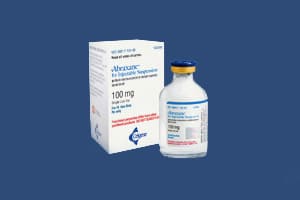 The NHS in England and Wales should not fund Celgene’s Abraxane when used in combination with Lilly’s Gemzar in certain pancreatic cancer patients, according to new guidance
The NHS in England and Wales should not fund Celgene’s Abraxane when used in combination with Lilly’s Gemzar in certain pancreatic cancer patients, according to new guidance
The National Institute for Health and Care Excellence (NICE) issued draft guidance that says no to the regimen for use in untreated metastatic pancreatic cancer as its “limited benefits compared to current treatments do not justify its cost”, according to the watchdog.
Abraxane (nab-paclitaxel) is a new formulation of the older generic chemotherapy drug paclitaxel and has been shown to work with Gemzar (gemcitabine) in clinical trials to help patients achieve overall survival (OS) rates of just over two months, compared to Gemzar on its own.
Current NICE guidance recommends that people with newly diagnosed pancreatic cancer are offered Folfirinox, a combination of five chemotherapy agents. However, this treatment can be associated with serious side effects and therefore can’t be given to everyone.
When this is the case, other options recommended for NHS reimbursement include Gemzar as a monotherapy alone or with Roche’s Xeloda (capecitabine).
In Celgene’s submission to NICE the firm even provided information that demonstrated Folfirinox is in fact more effective than its medicine when used with Gemzar as it has higher rates of overall survival.
Abraxane used with Gemzar was shown to be more effective than Gemzar alone, but resulted in more serious side effects.
Sir Andrew Dillon, NICE’s chief executive, said: “In the early stages, pancreatic cancer doesn’t usually cause any symptoms, which can make it difficult to recognise and means that many people are not diagnosed until the cancer is very advanced. Without treatment, survival may be only two to six months.
“Although [Abraxane] is more effective than one of the treatment options currently available, it is associated with more side effects and is also more expensive.”
NICE says that Abraxane costs £246 per 100mg vial with the company estimating that the average cost of a 28-day course of treatment to be £1,481.
NICE says the cost per QALY for Abraxane and Gemzar could be as high as £78,500 – well above the usual £30,000 QALY limit set by the agency. NICE did not say that Celgene offered a patient access scheme to lower the cost of treatment.
The UK charity Pancreatic Cancer Action (PAC) said in a statement: “In our opinion, [this decision] is a backward step by NICE and represents a serious setback for patients and clinicians in England.”
The charity added: “While the economic modelling criteria NICE uses found that Abraxane does not prove to be cost-effective, we believe that pancreatic cancer, with its low 3% five-year survival which has not improved in over 40 years, the fact that it is the UK’s fifth biggest cancer killer and that there are very few treatment options available to patients, should be considered as a special case.”
The drug can currently be funded by England’s £280m a year Cancer Drugs Fund, but the PAC says this is in danger of being dropped later this month as NHS England, which runs the Fund, intends to limit the number of medicines available via the Fund.




